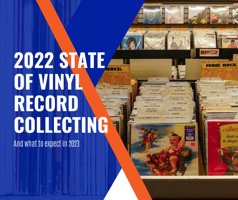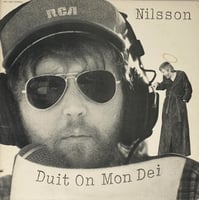Originally published August 23, 2020|Our Services AAGS Vinyl Record Ultrasonic Cleaning...
Deep-Clean Your Brand New Vinyl Records—Learn Why, It's Shocking!
Originally published July 5, 2020 | Vinyl Community Discussion
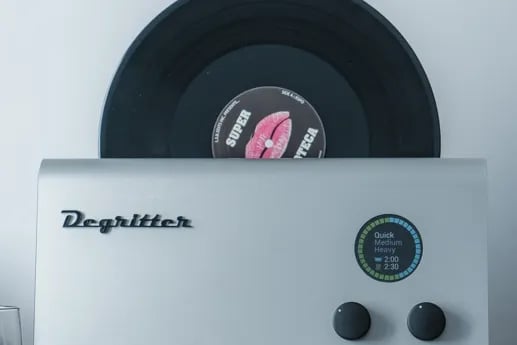
You've just gotten home from the record store with your brand new records. You unwrap the shrink and open them up to look at the artwork and check the disc for defects. There are some light amounts of particles and dust on the record, but otherwise, they look great! You put the first disc on your table, you start spinning, down goes the carbon fiber brush to clean off the visible packaging dust, and you're off to the races. The needle drops, and you hear glistening clean musical greatness! Right? Well... sometimes, but even if your brand new record sounds 'clean,' it isn't. In this article, we will provide some compelling reasons why you need to deep-clean your brand new vinyl records. We will also show you the results of an experiment we performed deep-cleaning brand new albums fresh out of the shrink. We experimented both on commonly available records and audiophile pressings. So if you would like to know what you need to make your brand new records sound like new, read on!
How Can My Brand New Record Be Dirty?
Records are made in pressings plants—pressing plants are factories—factories that make things out of PVC plastic. They use heat and trimming machines to make records as we know them. Yes, pressing plants are just factories. Some have better quality control measures than others, but at the end of the day, melted plastic, heat, steam, and plastic shavings are the name of the game. Another source of dirt are the record sleeves. Especially true of paper sleeves, paper dust from the paper mill adds to the list of dirt sources. To distill this entire paragraph down to just one sentence: Your brand new records have dirt on them.
We all have our carbon fiber anti-static brush, so we're good! Well, no. We will delve into the technical reasons a bit later in this article.
First, we will discuss three ways that dirt can impact your vinyl records, stylus, and your sound.
-
Dirt Is The Enemy To Your Vinyl Record
Imagine having a perfect hardwood floor, spreading gravel all over the floor, then walking over it. That is what happens when you play your records with dirt on them but at a microscopic level. Notice the first picture. You can see the debris in the grooves where a metal stylus will be running by at 33 1/3 or 45 RPM and will be dragging that debris along. After some time of doing that, you will start to hear some distortion, especially in the high frequencies. This happens because the dirt is changing the shape of the grooves.
When you combine the particles and debris that come from both the pressing plant, and the sleeve manufacturer, you have plenty of dirt on the surface of your brand new records that need to be cleaned thoroughly before running the stylus through the grooves.
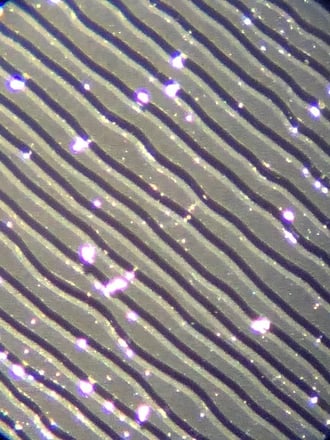
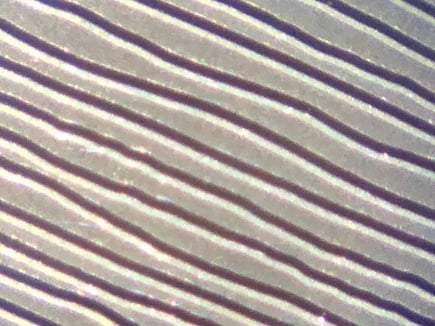
In the second picture, we can see the result of a high-end ultrasonic cleaning machine removing more than just the visible particles. Not only is the surface of the vinyl record clean, but the deepest parts of the grooves are also devoid of any dirt. It's like we gently vacuumed up the gravel from the floor, mopped the floor, and only walk on it with socks on our feet—the best possible scenario to keep your vinyl records in new condition.
-
Dirt Is The Enemy To Your Stylus/Needle
It would be inaccurate to say that if you keep your records clean, your stylus would never wear out. Of course, that is not true. Your stylus is a part on your turn table that you will inevitably need to replace at some point. They're like the tires on your car. However, similar to the tires on your vehicle, if you mistreat them, and don't take good care of them, you will have to replace them faster. Keeping your stylus clean is one way to increase its life. Another way to improve the lifespan of your record needle is to keep your records clean. Yes, deep cleaning your stylus and records will ensure the long-life of your listening gear and media, and keep you sounding good for years to come.
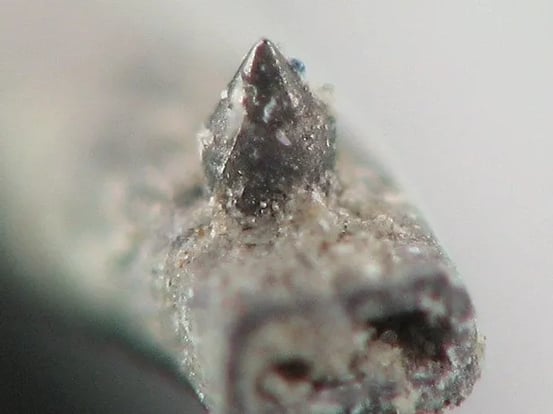
Dirty styli do not last as long as clean ones. (Image: www.audiokarma.com)
-
Dirt Is The Enemy To Your Sound
The surface noise we are used to is crackles and pops. And yes, some brand new records have enough dirt on them to cause crackles and pops fresh out of the shrink wrap. There is another, more controversial source of sound degradation for brand new records. During manufacturing, PVC plastic needs to be heated to the point of softening before pressing the grooves into the record. Once heated, a microscopic film usually resides on the surfaces of the grooves. While playable, are you getting the most out of your brand new records?
Audiophile Archive & Grading Services decided to experiment. We purchased eight brand new, mass-produced records. We also purchased eight high-end audiophile records. Once we opened them, we cleaned each one in our top-of-the-line automated record cleaner on a soap cycle and a rinse cycle. We were shocked by the results!
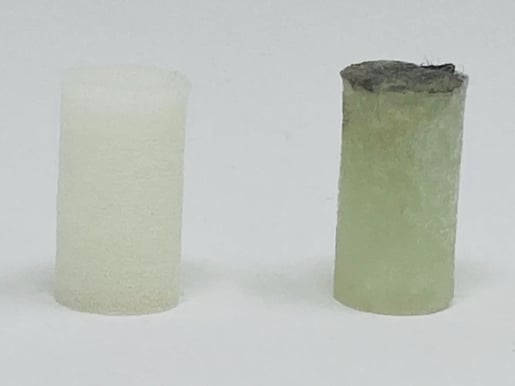
Eight Brand New Mass Produced Records: Left-Clean/Right-Dirty
What you are seeing is the filter from the Degritter ultrasonic cleaner. As seen in the first image, brand new records are far from clean when compared to a fresh filter. When looking at the surface of a brand new record, to some degree, you may just see dust particles. The dark color in the dirty filter is the film that we discussed earlier. However, what about low production high-end audiophile pressings? Would they be any cleaner than the mass produced ones?
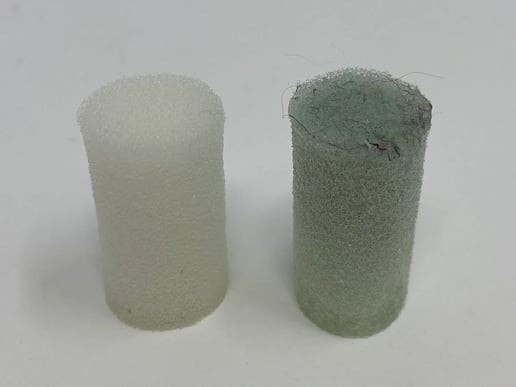
Eight Brand New Audiophile Records: Left-Clean/Right-Dirty
The results? They're about the same! Less dust, but about the same amount of dark color. What have we proven? That brand new records are inherently dirty, and they should be deep cleaned in order to have the best sound. Aside from the crackles and pops, what do we gain sonically from deep cleaning a brand new record? After this manufacturing 'sludge' is removed, the music opens up, resulting in a more realistic sound. We've also noticed that dynamics are improved after cleaning.
Conclusion
Clean records are happy records, even new ones! That is why you shouldn't play your new records until they're deep cleaned. The best possible results come from ultrasonic cleaners that have no parts that touch the surface of the records. If one of those cleaners are outside of your budget for a while, it doesn't mean that it's impossible to have your records ultrasonic cleaned.
We can do it for you for less than a dollar per day with our Ultrasonic Cleaning Subscription service for your vinyl records! Watch the video above, and learn more by clicking HERE! Keep your records clean and sounding great, and at the same time, keep your equipment running at its best.
If you are interested in vinyl record encapsulation or any of our other services, please visit us at aagservices.org to learn more about how you can bring your collection to the next level! info@aagservices.org


